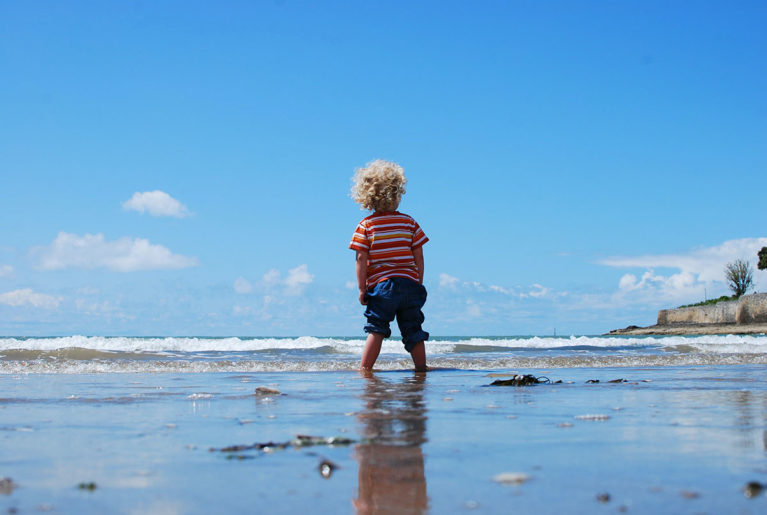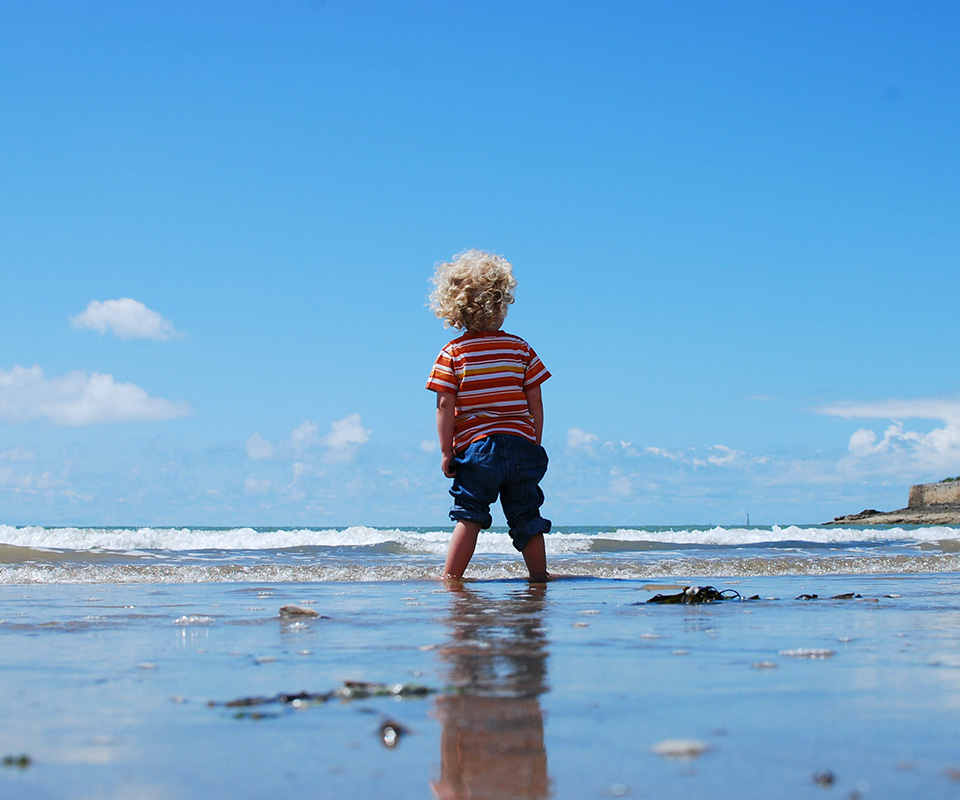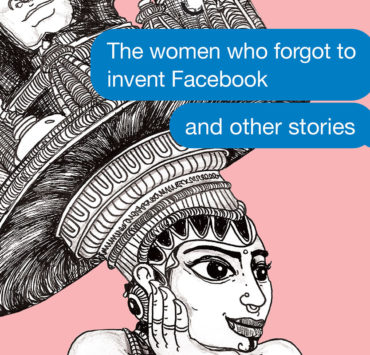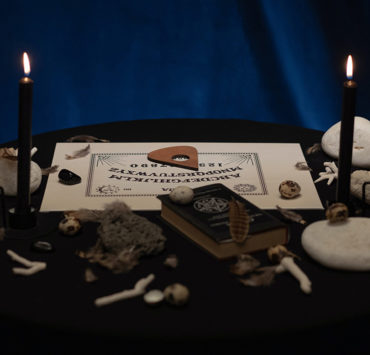Sean says it isn’t safe, swimming alone.
“No one will notice if you’re drowning,” he says.
“If I’m going to die an undignified death,” I say, “I’d prefer not to have an audience.”
Sean does not think death is something to joke about. Sean is a worrier; the sort of man who takes a wet wipe to every apple he eats, just to be on the safe side. Sean would rather I didn’t swim outdoors. If I simply must—Sean’s own words—he’d rather I swam at the main strand, cautiously, in full view of the lifeguards’ station.
Instead, I swim here, in a tiny cove cut off by boulders on one side and a sheer cliff face on the other. A thick band of seaweed separates the sand from the sea beyond. In summer it smells like soy sauce and warm piss. The kelp flies rise in consternation when I pick my way through. In winter it is less pungent but slippier. I wear neoprene booties and step carefully. My feet are ludicrous: two fat slugs squirming at the end of my shins. At high tide the seaweed swims with me. Its smooth tongues lap my arms and legs. I think about Jonah in the belly of the whale; all those slick intestines sliding against his skin. I feel small in myself and held.
I choose to swim here because it is always empty. The seaweed puts people off. It is a decent hike from the road, through fields and a small forest. Once I brought Sean with me. He was meant to read whilst I swam. Sean could not concentrate for watching me. I could not swim easily with his eyes on me. Afterwards we had words in the car. We argued about what should be made for supper, aware that this was code for a much deeper frustration. Sean did not come to the beach again.

It is warm today. The beach hums in the heat. I leave my towel, water bottle, and book in a pool of shade next to the rocks. I slip my sundress over my head, heel my trainers off, and swim my usual six laps of the bay. Though there’s hardly any wind, the sea is choppy. Towards the end of the fifth lap my arm muscles begin to burn. By the sixth, I’m exhausted. The sun is loud in my eyes as I thrash clumsily through the shallows. I am thinking about the granola bar which I might have brought from home. I’m already on the beach before I notice them.
There are three of them, or rather two and a half. Anything younger than sixteen counts as half in my book. Sean disagrees. Sean likes children. Occasionally, he raises the possibility of acquiring some. I’ve told him I’m not interested. I suspect Sean has no specific interest either. He sees children as something which should be done at our age. He has similar feelings about personal trainers.
“He sees children as something which should be done at our age. He has similar feelings about personal trainers.”
I make my way up the beach, squeezing the water out of my hair. I stare at them. They haven’t noticed me. She is leafing through a glossy magazine, pausing between pages to tip the ash from her cigarette into the sand. He is dozing on his front, one hand draped heavily across her thigh as if afraid someone will run off with her while he sleeps. Her thigh is the fake mahogany colour of a flat pack desk. His swimming trunks are Barbie pink and printed with anthropomorphic pineapples. The pineapples dance across the hump of his backside, shaking their tiny maracas and tambourines like billy-o. The baby is wearing nothing but a white, disposable nappy. It is stuffing sand into its mouth in greedy handfuls. The sand is stuck to the snot running out of its nose. I look at the baby’s face. It reminds me of an ice cream dipped in hundreds and thousands, but dirtier.
I should feel sorry for the baby. I don’t.
The person I feel sorry for is myself. I shouldn’t have to share my beach with them.
I could leave. If Sean was here, he’d say, just leave them to it. You’re only going to sit their seething if you stay. I am not going to leave. This is my beach. In the two years since I began swimming here, I have encountered no other human beings. I have assumed a certain degree of ownership. The beach is like that thin strip of flowerbed between our garden and next door’s. Does it belong to us? Does it belong to them? Who knows? Sean said we should consult the architect’s plans. I said, “to Hell with that,” and stuck a couple of rhododendrons in. Now the flowerbed is ours. The same principle applies to this beach.
I walk over to my things. I try to look unperturbed. I spread my towel out and lie down, then remember the granola bar. I fish around inside the pockets of my sundress and find two used tissues and a biro. No granola bar. I glance over at the baby. The baby is looking hard at me. It seems to register my disappointment. Babies can be very perceptive. Sometimes babies look at me and they do not look like babies. They look like adults trapped in baby faces. I do not like it when babies look at me like this. I find it unsettling. I pretend to be searching for a tissue. I lift the less crumpled of the two out of my sundress pocket and blow my nose dramatically. I am doing this for the baby’s benefit. I do not want it to know I haven’t found what I’m looking for. I smile at the baby. The baby goes back to eating sand.
I open my book and begin to read. I read the first paragraph four times and cannot remember anything I’ve read. I read on. The second paragraph makes no sense divorced from the first. I return to the first paragraph. It is uncomfortable holding the book with one hand and shielding my eyes with the other. I think about my sunglasses sitting on the telephone table at home. I think about Sean shouting from the living room, “your sunglasses are on the telephone table,” and how I’d shouted back, “I’m grand without them. There’s hardly any sun.” I reposition the book so the shadow of it falls across my face. You’re grand without sunglasses, I tell myself. I begin to read the first paragraph again.
Something shudders in the corner of my eye. I peer around the edge of my book. The baby has quit eating sand. It is shuffling down the beach towards the sea. The man and the woman have not noticed. The man is sliding his hand up and down the woman’s thigh. Up and down. Up and down. Like she is a car in need of waxing. The woman has lifted her hand to her face in order to examine her fingernails. Her fingernails are such a vibrant shade of red I can see them screaming from the other side of the beach. The man’s face is pressed into his beach towel. The woman is preoccupied with her fingers. Neither have noticed that the baby has now reached the seaweed trench.
The baby considers the seaweed. It glances backwards as if waiting to be stopped, then ploughs on, hands and knees scouring through the scratchy kelp. Crawling forward, the baby makes a noise like scrunched up paper. Surely the man and woman will hear. They will look up and see the baby moving towards the sea. I can hear the baby. I can see the baby. The white flag of its nappy blooming against the black seaweed. The black flies shimmering around its chubby shoulders. The clean cup of its upturned soles like a pair of parentheses ploughing through the kelp. I can see the baby. But it is not my baby. I did not bring it here to this quiet beach.
The man has turned his back to me. He lies on one shoulder now, facing the woman. He pushes his mouth into her neck. He nuzzles her like a dog. The anthropomorphic pineapples on his swimming trunks stretch with him. Their happy, grinning faces distort as he throws a single leg over the woman’s thighs. The woman continues to read, flicking listlessly as he clings to her side like a giant baby. It is ugly to look at them. Her distance. His neediness. Moments like this should not be seen. Sean and I only touch in private. Sometimes, when we are out and about, drinking coffee or visiting a garden centre, he will reach for me. I always stop him. I do not want anyone to see the way my face goes when he kisses me. The dreadful softness. The need.
“It is ugly to look at them. Her distance. His neediness. Moments like this should not be seen.”
The baby has reached the shallows. It sits at the sea’s edge, its filthy white nappy beginning to bloat. I watch the baby from behind my book. I think, this is the kind of set up people take photographs of: babies, beaches, sunny days. I also think, someone should lift that baby before it gets any further. I hold both thoughts at some distance. I do not, for example, think, I wish I had a phone with photo-taking ability so I could capture this beautiful moment. Neither do I think, I should rise from my beach towel and grab that baby before it crawls into the sea. Sean says I am exceptionally good at removing myself from responsibility. Like when I say somebody should do something about the polar ice caps or the teenagers who stand about, drinking at the end of our street, and what I really mean is somebody who isn’t me.
I do not want the baby to crawl into the sea. But I do not think it is my job to stop the baby crawling into the sea. I did not make the baby. I did not bring it here to this beach. I certainly did not leave the baby to eat sand and crawl through seaweed while I read Cosmopolitan or dry hump my girlfriend’s leg. I do not want the baby to crawl into the sea but a small, mean part of me thinks it would be quite proper for the man and woman to look up, seconds from now, and see the baby about to crawl into the sea and in that brief, heart stopping moment, realise—perhaps for the first time—that they are dreadful, selfish people who do not deserve this baby or this beach.
I have abandoned my book. It is impossible to concentrate with the moment tottering in front of me, like a baby up to its oxters in the rising tide. I have given up on my book though I’m still holding it like a shield in front of my face. I am sideways watching the man and the woman. I am waiting, waiting, still waiting for them to look up and notice the baby, when the wave comes crashing in. I do not see the wave until I hear it. The wave sounds like handfuls of pebbles dropped from a great height. The baby screams. Then the woman. Then the man.
I look up from my book. I arrange my face appropriately. This is the face of someone who has only just noticed a baby being swept out to sea. I rise to my feet. I sprint down the beach, through the seaweed, to the sea’s edge. My mouth says all the right words. Mostly expletives. My head is much neater. It is already rearranging the last few minutes, moving myself to the edge of the picture. Later, when I recount the afternoon’s events to Sean, I will be almost absent. I will say, it was so very sad, in such a way that Sean understands the baby had nothing to do with me.








